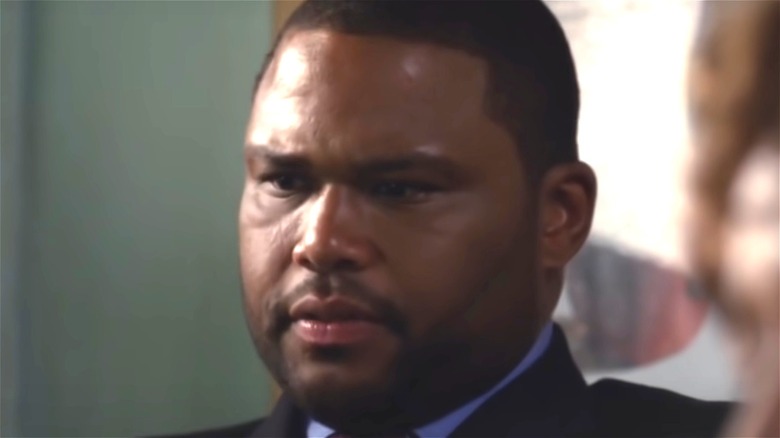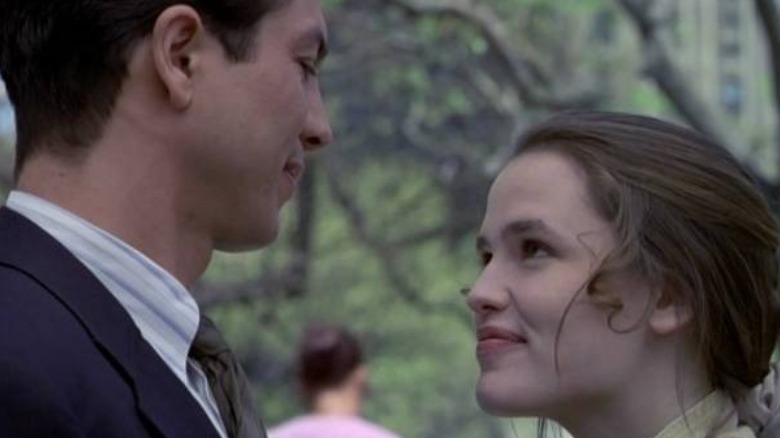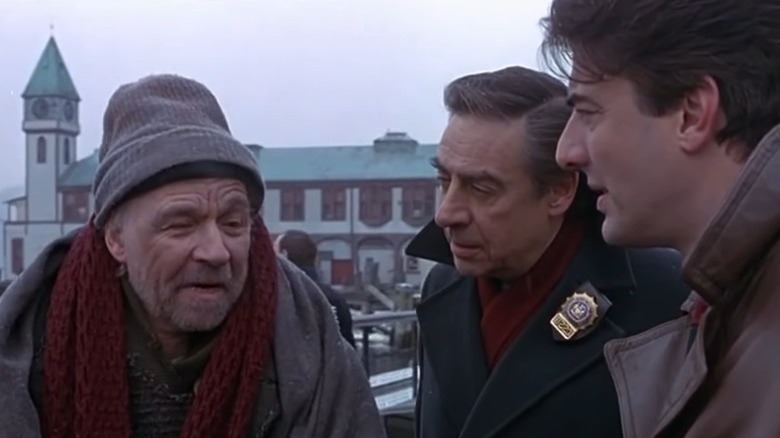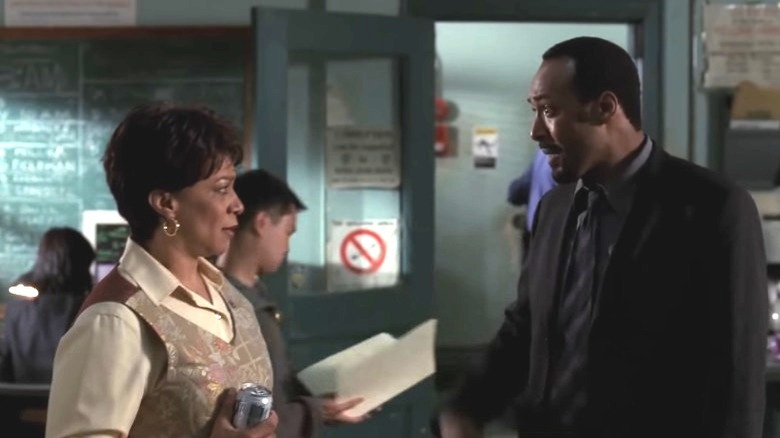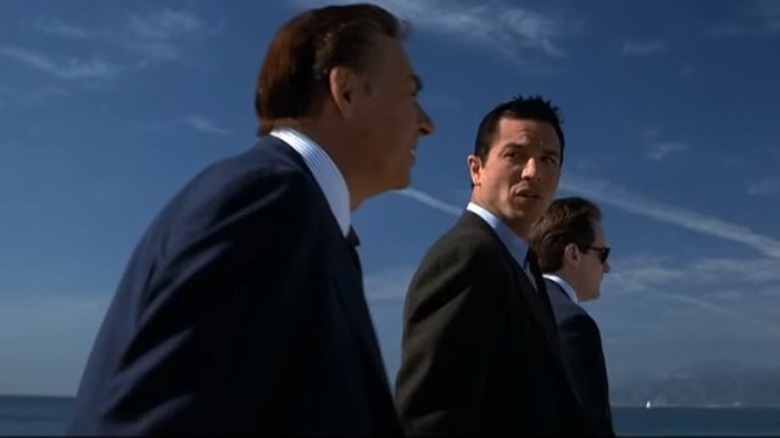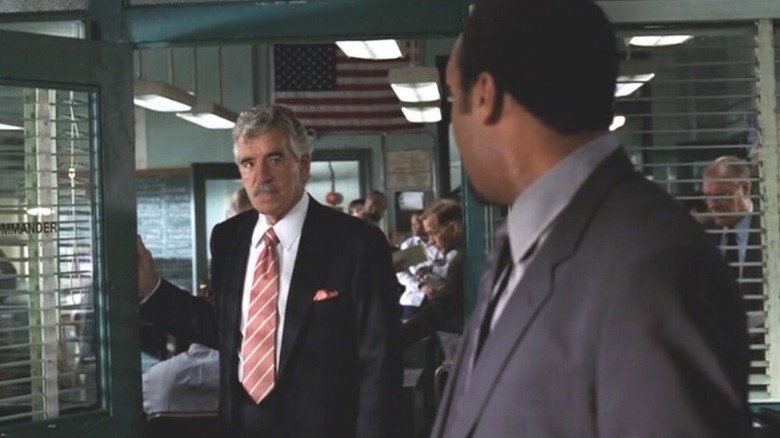The Most Offbeat Episodes Of Law & Order According To Fans
It's become a particularly hot topic since the announcement of an upcoming new season, but even without that prompt, it's impossible to talk about the history of American television, or television in general, without talking about "Law & Order." The long-running NBC procedural drama fundamentally changed the face of TV, chronicled a whole 20 years of social, political, and cultural changes in American society, and managed to offer up a higher number of gripping, unforgettable episodes than virtually any other drama series in history.
Many of these episodes have become downright classics, even while adhering to the show's time-tested signature structure: crime discovered, crime investigated by the NYPD's 27th Precinct, and suspect prosecuted by the district attorney's office. "Law & Order" proves that there's enough room for variation within this structure to make seasons and seasons of top-shelf television. But naturally, for a show that ran as long as it did, there were a few times when the writers decided to shake things up a bit, either tossing out elements that are considered "Law & Order" trademarks, or exploring new and surprising storytelling avenues. In fact, these episodes were the subject of a 2021 Reddit thread on the r/LawAndOrder sub. These are their stories.
Aftershock placed a unique emphasis on the characters' emotional lives
Reddit user pineapple1120 made the following conversation prompt on r/LawAndOrder: "Outside of 'Aftershock,' are there any episodes of Law and Order that feel...off to you?" The poster then went on to explain, "Not 'off' in the sense that they're bad or anything, but more along the lines of having a different vibe in comparison to most episodes."
As evidenced by the post's title, the most obvious and famous example of an "off" "Law & Order" episode would be "Aftershock," the Season 6 finale, written by Janis Diamond, story by Michael S. Chernuchin, and directed by Martha Mitchell. Widely regarded as one of the show's finest, most emotionally stirring hours, "Aftershock" was notable for being the only episode in the entire run of "Law & Order" that doesn't feature a case, focusing instead on the regular characters' personal lives.
"Aftershock" follows the psychological unraveling of detectives Lennie Briscoe (Jerry Orbach) and Rey Curtis (Benjamin Bratt) and A.D.A.s Jack McCoy (Sam Waterston) and Claire Kincaid (Jill Hennessy) after witnessing the execution of an inmate they brought to justice. Each character reacts in an unique, highly-charged way, leading to a litany of tragic, indelible developments that forever changed the trajectory of "Law & Order." The episode also features Jennifer Garner in her only series appearance.
Mayhem was a frantic, innovatively structured hour
The most-upvoted comment on pineapple1120's Reddit thread was made by a poster by the name of u/gnorrn, who cited the 17th episode of Season 4, "Mayhem," as an unusual episode of "Law & Order" for two reasons — its "very large number of crimes," and "almost all the episode [being] taken up by the police investigation, with very little legal component."
Another notable hour of "Law & Order," "Mayhem" does, indeed, have the distinction of being centered entirely around Detective Briscoe and Junior Detective Mike Logan (Chris Noth) as they deal with three separate homicides over the course of 24 hours. This includes an aspiring actor shot in his own car, a woman who murders her cheating husband, and a grocery store cashier killed during a robbery.
Written by René Balcer and Michael S. Chernuchin and directed by James Quinn, "Mayhem" wows viewers with its original structure and unusual tone for the show. Indeed, Reddit user ShowMeTheTrees even replied to the comment that cited it, writing, "'Mayhem' is my very favorite episode of all. It was so innovative, offbeat and funny."
Couples told an unusually jam-packed story with three murders and a kidnapping
"Mayhem" wasn't the only episode of "Law & Order" to be cited by u/gnorrn for its hyperactive, police-driven bent. The fan named two episodes as being unusual in the same respects, with the other one being the Season 13 episode "Couples" — which had good reason to be a special one, what with it being the show's 300th installment.
This near-universally beloved episode, written by Lorenzo Carcaterra and directed by David Platt, follows Briscoe and Junior Detective Ed Green (Jesse L. Martin) on another absurdly frantic shift. This time, the two NYPD detectives once again catch three homicide cases over the course of a few hours, but things get even more complicated from there. They also stumble upon an ongoing kidnapping situation and find out that one of the three murders is connected to a fourth, 10-year-old murder case.
The title of the episode refers to the common theme that emerges from all the concurrent investigations. As Briscoe and Green come to learn, all the crimes have something to do with domestic disputes gone awry.
The Season 7 three-parter took the series to new places
Like a lot of network TV procedurals that prioritize a more episodic approach with individual, self-contained narratives, "Law & Order" did occasionally tell stories that spilled out over the edges of a single week's about 48-minute window. Two examples of this are the Season 1 two-parter "The Torrents of Greed" and the two-hour Season 9 finale "Refuge." But only once in the show's run did it tell a story so expansive it takes up three episodes.
The "trilogy," comprising of Season 7 episodes "D-Girl," "Turnaround," and "Showtime," is notable not only for the complexity and length of its storyline, but also for relocating a lot of the action to Los Angeles. Written by René Balcer, Ed Zuckerman, and Gardner Stern and directed by Ed Sherin, the three-parter begins with the discovery of a corpse bereft of a head or limbs, which is soon found to be the body of a movie studio executive — prompting Briscoe and Curtis, and later McCoy and Assistant D.A. Jamie Ross (Carey Lowell), to travel to the West Coast in search of more answers.
"D-Girl," "Turnaround," and "Showtime" were collectively cited by Reddit user Draculalia, and u/atowntommy agreed that "McCoy and Ross' California adventure was pretty strange." Meanwhile, u/gnorrn disagreed, arguing that, leaving aside the length and the setting, "in terms of content it's just an exceptionally good example of the standard L+O formula."
Paradigm was marked by a jarring cast change
Jerry Orbach's performance as Lennie Briscoe became iconic for a reason. The detective's debonair demeanor, weathered cynicism, and unwavering dark sense of humor makes him one of the defining figures of 1990s television, and a key element of the runaway success of "Law & Order" throughout the decade. For a lot of viewers, it got to a point where Briscoe was "Law & Order." So, it stood to reason that something about the show wouldn't feel right without him.
When Orbach left the show in 2004, the plan was that he would continue to star on the spin-off "Law & Order: Trial by Jury," with a lighter schedule to accommodate his increasingly demanding treatment for prostate cancer (via The News-Times). Briscoe was, therefore, written off the original show rather unceremoniously, with Senior Detective Joe Fontana (Dennis Farina) simply transferring to the 27th Precinct and taking over for him in the Season 15 premiere, "Paradigm," written by Richard Sweren and directed by Matthew Penn. Although Fontana eventually became beloved in his own right, Reddit user everythinglatte noted that "The first episode without Lennie Briscoe was the game-changer for me. I just couldn't finish the series when he wasn't there."
Orbach died the same year at 69 years old, after having filmed only two episodes of "Law & Order: Trial by Jury." In a testament to his performance's greatness, Briscoe's absence left a gap that the "Law & Order" franchise could never really fill.
